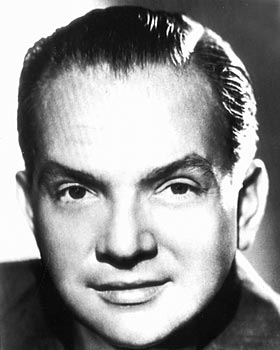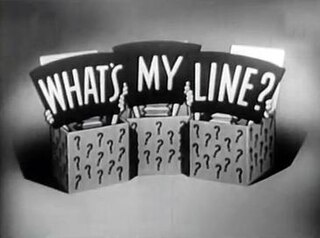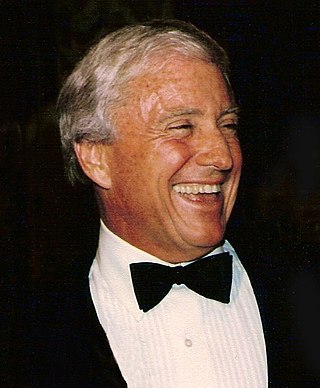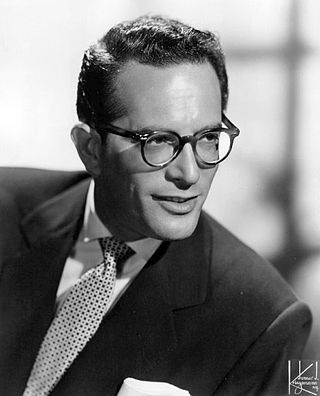
Match Game is an American television panel game show that premiered on NBC in 1962 and has been revived several times over the course of the last six decades. The game features contestants trying to match answers given by celebrity panelists to fill-in-the-blank questions. Beginning with the CBS run of the 1970s, the questions are often formed as humorous double entendres.

Carl Reiner was an American actor, stand-up comedian, director, screenwriter, and author whose career spanned seven decades. He was the recipient of many awards and honors, including 11 Primetime Emmy Awards, a Grammy Award, and the Mark Twain Prize for American Humor. He was inducted into the Television Hall of Fame in 1999.

Mark Leo Goodson was an American television producer who specialized in game shows, most frequently with his business partner Bill Todman, with whom he created Goodson-Todman Productions.
To Tell the Truth is an American television panel show in which four celebrity panelists are presented with three contestants and must identify which is the "central character" whose unusual occupation or experience has been read aloud by the show's moderator/host. When the panelists question the contestants, the two impostors may lie whereas the "central character" must tell the truth. The setup adds the impostor element to the format of What's My Line? and I've Got a Secret.

What's My Line? is a panel game show that originally ran in the United States, between 1950 and 1967, on CBS. The game show started in black and white and later in color, with subsequent U.S. revivals. The game uses celebrity panelists to question contestants in order to determine their occupation. The majority of the contestants were from the general public, but there was one weekly celebrity "mystery guest" for which the panelists were blindfolded. It is on the list of longest-running U.S. primetime network television game-shows. Originally moderated by John Charles Daly and most frequently with regular panelists Dorothy Kilgallen, Arlene Francis, and Bennett Cerf, What's My Line? won three Emmy Awards for "Best Quiz or Audience Participation Show" in 1952, 1953, and 1958 and the Golden Globe Awards for Best TV Show in 1962.

The Arthur Murray Party is an American television variety show that ran from July 1950 until September 1960. The show was hosted by dancers Arthur and Kathryn Murray, the show featured various acts and celebrity guests and acted as advertisement for their chain of dance studios. Each week, the couple performed a mystery dance, and the viewer who correctly identified the dance would receive two free lessons at a local studio.

Mervyn Edward Griffin Jr. was an American television show host and media mogul. He began his career as a radio and big band singer, later appearing in film and on Broadway. From 1962 to 1986, Griffin hosted his own talk show, The Merv Griffin Show. Griffin also created the game shows Jeopardy! and Wheel of Fortune through his own production companies, Merv Griffin Enterprises and Merv Griffin Entertainment.
The Merv Griffin Show is an American television talk show starring Merv Griffin. The series ran on NBC from 1962 to 1963; in first-run syndication from 1965 to 1969 and again from 1972 to 1986; and on CBS from 1969 to 1972.

John Charles Patrick Croghan Daly was an American journalist, host, radio and television personality, ABC News executive, TV anchor, and game show host, best known for his work on the CBS panel game show What's My Line?

Robert Q. Lewis was an American radio and television entertainer, comedian, game show host and actor. Lewis added the middle initial "Q" to his name accidentally on the air in 1942. He was thinking of radio comedian F. Chase Taylor's character Colonel Lemuel Q. Stoopnagle, and "when I signed off, I declared 'This is Robert Q. Lewis.' I don't know why but that got lots of good reaction." He decided to retain the initial, telling interviewers it stood for "Quizzical."
KDKA-TV, also known as CBS Pittsburgh, is a television station in Pittsburgh, Pennsylvania, United States, serving as the market's CBS outlet. It is owned and operated by the network's CBS News and Stations division alongside Jeannette-licensed WPKD-TV, an independent station. The two stations share studios at the Gateway Center in downtown Pittsburgh; KDKA-TV's transmitter is located in the city's Perry North neighborhood. KDKA-TV, along with sister station KYW-TV in Philadelphia, are the only CBS-affiliated television stations east of the Mississippi River with "K" call signs.

The Name's the Same is an American game show produced by Goodson-Todman for the ABC television network from December 5, 1951 to August 31, 1954, followed by a run from October 25, 1954 to October 7, 1955. The premise was for contestants to guess the names of persons whose actual name corresponded to a famous person, celebrity, a place, common object or action.
Scattergories is an American game show on NBC daytime hosted by Dick Clark, with Charlie Tuna as announcer, that aired from January 18 to June 11, 1993. The show, which was adapted from the Milton Bradley board game of the same name, was produced by Reg Grundy Productions and was the second to last American game show to be produced by the company.

You Don't Say! is an American television game show that had three separate runs on television. The first version aired on NBC daytime from April 1, 1963, to September 26, 1969, with revivals on ABC in 1975 and in syndication from 1978 to 1979. The last two incarnations were executive produced by Ralph Andrews and produced and directed by Bill Carruthers.

Play Your Hunch was an American game show first hosted by Merv Griffin from 1958 to 1962 and then hosted by Gene Rayburn and finally by Robert Q. Lewis until 1963. The announcers for the show were, respectively, Johnny Olson, Wayne Howell and Roger Tuttle. In 2001, Play Your Hunch was ranked #43 on TV Guide's "50 Greatest Game Shows of All Time".
Jeopardy! is an American television game show created by Merv Griffin, in which contestants are presented with trivia clues in the form of answers and must phrase their responses in the form of a question. The show has experienced a long life in several incarnations over the course of nearly a half-century, spending more than 12 years as a daytime network program and having currently run in syndication for 39 seasons. It has also gained a worldwide following with a multitude of international adaptations.

Maggi McNellis was an American radio and television personality and talk show hostess from the 1940s through the 1960s. In the latter part of her life, she became a New York City society hostess.
The Vise is an American detective drama that was broadcast on ABC (1955–1957) and then moved to NBC (1957–1960). The series is a reboot of the ABC Mystery Theater radio and television series. It was produced by the Danzigers and starred Donald Gray as Mark Saber. It mostly ran during prime time in the late 1950s.
Confession is an American interview television series. Hosted by Jack Wyatt, the show explored the root causes of crime and possible ways of addressing them. The series aired locally in the Dallas, Texas, area beginning early in 1957 and nationally on ABC during the summer of 1958 and the 1958–1959 television season.












